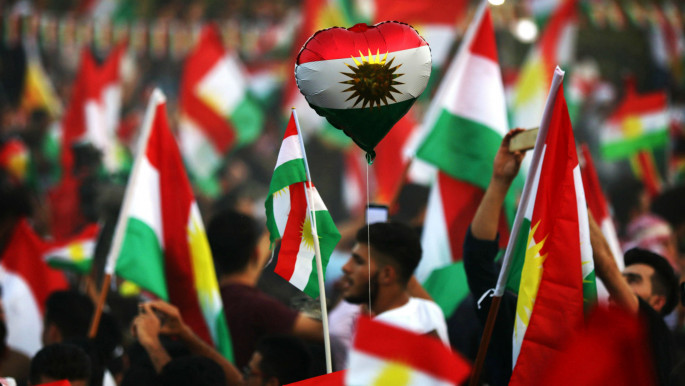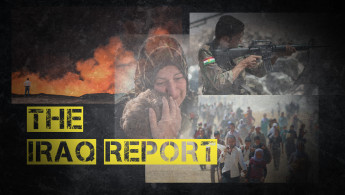The Iraq Report: Kurds take centre stage from IS
The Iraq Report is a new weekly feature at The New Arab.
Click here to receive The Iraq Report each week in your inbox
Although it briefly appeared that the various factions in Iraq may have found some semblance of unity upon which to build in the fight against the Islamic State group, their common enemy, Iraq has never looked as fragile as it does today. The Iraqi government has directly threatened a military intervention in Kurdish-controlled regions claimed by the Kurdistan Regional Government in Erbil, and the KRG has responded with stubborn defiance in proceeding with its independence bid.
The problems between Baghdad and Erbil have drawn a number of international powers to weigh in on the dispute, with most agreeing with Baghdad that now is not the time for an independence referendum, even a non-binding one. However, with the upcoming vote acting as a distraction, there is a possibility that IS may use the fracturing of the anti-IS alliance as an opportunity not only to survive, but to thrive.
Baghdad threatens Erbil with ‘military intervention’
In what is swiftly turning into a territorial – and potentially deadly – game of chicken between Baghdad and Erbil, foreign powers have attempted to persuade KRG President Masoud Barzani to cancel - or at least delay - the referendum set for 25 September, in order to calm simmering tensions.
According to an Iraqi official familiar with the diplomatic efforts to convince the KRG to change course, the United States led efforts over the weekend to persuade the Kurdish leadership by offering them a number of incentives, agreed to by Baghdad.
Speaking to The New Arab on condition of anonymity, the government official said that Barzani had been offered guarantees by the US, Britain and France that the issues of oil revenue-sharing, control over disputed territories such as Kirkuk, resuming salaries for KRG civil servants, and “rebalancing” the number of government employees from either side in key government ministries would all be up for discussion and a negotiated settlement.
The offer came as the Iraqi Constitutional Court ruled that the referendum was illegal and must be cancelled, leading to accusations from the Kurds that the court was compromised and politicised in favour of Baghdad. The Kurdish leadership also reconfirmed that the referendum would still go ahead, though promised to “study the proposals” put forward by the western powers and backed by the United Nations.
 |
The Kurds are likely to be hesitant to accept such a proposal, however, as they view such diplomatic efforts as a stalling tactic with no guarantee that Kurdish demands will be met by the end of negotiations. Further, the Kurdish voter base now have great expectations that the referendum will go ahead, fuelling nationalist and secessionist sentiment, and a U-turn from the KRG would be seen by many as a betrayal.
The KRG’s stubbornness in holding the plebiscite has enraged the Iraqi government who have now threatened the Kurds with military action. On Saturday, Prime Minister Haider al-Abadi made it clear that he would order the Iraqi armed forces – which includes pro-Iran Shia Islamists from the Popular Mobilisation Forces – to militarily intervene if fighting breaks out.
Abadi told Associated Press that if the Iraqi population was “threatened by the use of force outside the law, then we will intervene militarily”. Warning the KRG to take him seriously, Abadi further added: “If [the Kurds] challenge the constitution and if you challenge the borders of Iraq… this is a public invitation to the countries in the region to violate Iraq’s borders as well.”
Last week, Barzani threatened that he would order the Peshmerga to “prepare to draw our own borders” if Baghdad did not come to terms with the expected “Yes” vote.
Blood spilt in Kirkuk as rhetoric sharpens
Baghdad’s threats of military action against the separatist ambitions of the Kurdish leadership mirrors the stance of the Baathist Saddam Hussein regime that was deposed by a US-led invasion in 2003.
While both parties in power in Baghdad’s Green Zone and in the KRG helped lobby Washington and other major western powers to instigate regime change in Iraq before 2003, arguing that the Baathist dictatorship was behind the ills of Iraq, these problems have persisted and become even more entrenched since the Bush administration imposed democracy on Iraq.
Adopting the sharp and controversial rhetoric for which he is known, former prime minister and current vice-president, Nouri al-Maliki, said on Sunday that his country would “not allow the creation of a second Israel in the north of Iraq”. The Iran-backed vice-president made his remarks to US Ambassador Douglas Silliman, alluding to the fact that Israel openly supports Kurdish secession.
A day after Maliki’s remarks, violence between ethnic groups broke out in the disputed city of Kirkuk, with Kurdish assailants opening fire on the offices of a Turkmen group. The Iraqi Turkmen Front – who, along with Arab allies, oppose the referendum – said their office had been attacked by Kurdish militants on motorcycles, with the exchange of fire leading to the death of one attacker. The brother of the slain attacker, a Kirkuk police officer, later returned to exact vengeance, and order was only restored after a multi-ethnic force was deployed and a curfew imposed.
The violence demonstrates the flammable nature of the multi-ethnic city of Kirkuk and the surrounding region, claimed by the Arabs, Kurds and Turkmen. While the Kurds – and Kirkuk’s governor - predominantly support Kirkuk’s inclusion in the referendum, the Arabs and Turkmen strongly object and are therefore sometimes seen as a “security threat”.
In November last year, Amnesty International accused Kurdish authorities of bulldozing Arab homes in Kirkuk before banishing their owners. In May, Human Rights Watch released a damning report accusing the KRG of forcing Turkmen out of the oil-rich city. These and other documented actions suggest that the KRG or forces under its authority may be responsible for ethnic cleansing of non-Kurds from Kirkuk, raising fears of demographic changes.
If Arabs and Turkmen continue to feel threatened, they may retaliate against Kurdish security forces, whether they have common ground with Baghdad or not. Most of Kirkuk’s Arab residents are Sunni, a demographic that feels heavily persecuted by Baghdad. Nevertheless, they may retaliate against any Kurdish attempts to force them out, or bids for their city to fall permanently under Kurdish authority.
 |
| Kurdish civic sentiment is surging ahead of the independence referendum [Getty] |
Regional powers threaten Kurdish leadership
While Israel is the only country to openly support Kurdish independence – with clear indications that the KRG is also supported by the UAE in its aspirations – Iraq’s more immediate neighbours have nothing but ire for the vote.
Iran warned on Sunday that independence for Iraqi Kurdistan would mean an end to all border and security arrangements with the KRG, and threatened that Tehran may decide to ignore rules of engagement agreed between the two sides if the referendum were to take place.
“Border agreements stand only with the central government of Iraq, and the secession of the Kurdistan region from the central government of Iraq would mean the [Iranian] blocking of all shared border crossings,” Ali Shamkhani, Iran’s national security chief, told state broadcaster IRIB.
Of perhaps greater concern to the KRG is the stance of the Turkish government. Ankara announced that it would bring forward a key cabinet-level national security meeting from the end of the month to 22 September to urgently discuss the independence referendum.
Turkish President Recep Tayyip Erdogan blasted the KRG’s plans as a “childish dream” on Monday, as Turkish troops conducted large military drills close to the Iraqi border and KRG-held territory. State broadcaster TRT World reported Erdogan as being highly critical of Barzani, accusing him of planning to break up Iraq.
“You [Barzani] knock on our door and get any kind of support when you are in trouble, but you go your own way when it comes to the disintegration of Iraq,” TRT World reported Erdogan as saying ahead of attending the United Nations General Assembly.
In addition to the US, Britain and other powers opposing the independence referendum, the KRG may be gravely concerned about the statements coming out of their two most powerful neighbours.
Ankara has traditionally maintained close ties with Erbil and is one of its largest trading partners, including facilitating Kurdish oil sales through its Ceyhan Port in southern Turkey. Iran, meanwhile, also conducts vast amounts of trade with the KRG, as well as providing diplomatic support and arbitration between Erbil and Baghdad.
An independent Kurdistan would find it extraordinarily difficult to exist without international support, especially if surrounded by hostile states. Although it seeks to model itself on Israel – also surrounded by states historically considered to be hostile to it – Tel Aviv enjoys global support as well as access to the sea, unlike Iraqi Kurdistan which is land-locked and at the mercy and the goodwill of its neighbours for access to trade routes.
This alone may ring alarm bells in Erbil, with all Kurdish factions being extremely wary of the potential folly of engaging in all-out warfare with the Iraqi government. It is therefore entirely possible that the KRG may press ahead with the “advisory” referendum to save face with their voter base, but will not act on it until it has received significant international support.
Click here to receive The Iraq Report each week in your inbox



